This article needs additional citations for verification .(September 2018) |
Namik Resuli (10 September 1908 - 12 September 1985) was an Albanian linguist and academic.
This article needs additional citations for verification .(September 2018) |
Namik Resuli (10 September 1908 - 12 September 1985) was an Albanian linguist and academic.
Born in Berat in 1908, after having accomplished elementary studies in Albania he went to Italy, where he finished his secondary studies and then graduated in glottology in the University of Turin. His doctorate thesis "Mbi shtresëzimet në gjuhën shqipe" was written under the guide of Professor Matteo Bartoli. Resuli returned in Albania in the 1930s and taught Albanian language in Elbasan Normal School, now Aleksandër Xhuvani University, as well as in Shkodër, and Tiranë. In 1939, he went to Rome to become assistant professor of Albanian language, working there for 10 years. During 1940–44 he worked in the Ministry of Education of Albania, for a period also Deputy Minister of Education, [1] and as a member of the Royal Institute of the Albanian Studies. [2] Together with Ernest Koliqi, he published a two-volume collection on Albanian literature, titled Shkrimtaret Shqiptare (Albanian writers), in 1941. [3]
During 1948-1957 he was a member of the International Center of Albanian Studies in Palermo, and in 1955 he became professor of Albanian language in the Università degli Studi di Napoli "L'Orientale" until 1971. In 1954 he published in Turin the magazine Shpirti Shqiptar (Albanian Soul). He died on 12 September 1985 in Turin.
His study on the Missal (Meshari) of Gjon Buzuku (Città del Vaticano, 1958) is the first of its genre in the history of Albanology, whereas his work Grammatica della lingua albanese (Bologna, 1985) is considered an important approach in teaching the Albanian language to foreigner speakers. [4] [5]
He was of the opinion that the standard Albanian language would naturally lean toward the dialects of Central Albania. [6]
The Albanian National Awakening, commonly known as the Albanian Renaissance or Albanian Revival, is a period throughout the 19th and 20th century of a cultural, political and social movement in the Albanian history where the Albanian people gathered strength to establish an independent cultural and political life as well as the country of Albania.
Shqiptar is an Albanian ethnonym (endonym), by which Albanians call themselves. They call their country Shqipëria.

Eqrem Çabej was an Albanian historical linguist and scholar who, through the publication of numerous studies gained a reputation as a key expert in research on Albanian language, literature, ethnology and linguistics.
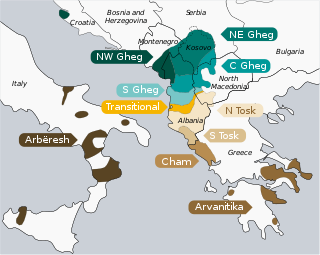
Albanian is an Indo-European language and the only surviving representative of the Albanoid branch, which belongs to the Paleo-Balkan group. Standard Albanian is the official language of Albania and Kosovo, and a co-official language in North Macedonia and Montenegro, as well as a recognized minority language of Italy, Croatia, Romania and Serbia. It is also spoken in Greece and by the Albanian diaspora, which is generally concentrated in the Americas, Europe and Oceania. Albanian is estimated to have as many as 7.5 million native speakers.

Dhimitër Beratti or Berati was an Albanian politician and journalist. One of the signatories of the Albanian Declaration of Independence Beratti served as secretary of the Albanian delegation at the Paris Peace Conference in 1919.

Gjergj Qiriazi was an Albanian patriot, author, educator, translator, Protestant Bible distributor, organizer of the First Congress of Monastir (1908), and activist of the Albanian National Awakening.

Naum Veqilharxhi was an Albanian lawyer and scholar. In 1844, he published using a unique alphabet for the Albanian language with characters he had created himself, the Vithkuqi script. Veqilharxhi is one of the most prominent figures of the early Albanian National Awakening, and is considered by Albanians as its first ideologue.
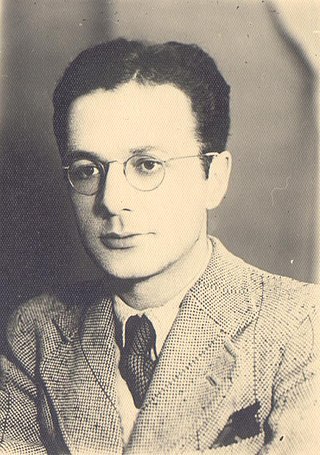
Dhimitër Shuteriqi was an Albanian scholar, literary historian, and writer. He participated in the anti-fascist National Liberation Movement. After the war, he was a member of the People's Assembly and one of the founders and later president of the Albanian League of Writers and Artists. In addition to a series of books and novels, he has published numerous volumes of textbooks, especially those on the History of Albanian Literature for high schools.
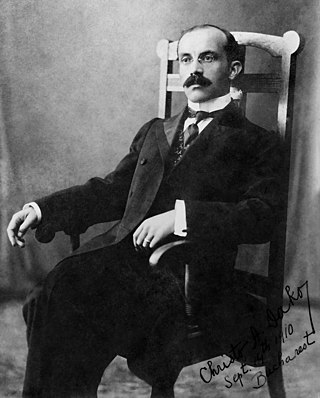
Kristo Dako (1880–1941), son of Anastas Dako, was an Albanian patriot, author and educator of the early 20th century.

Andrea Shundi is an Albanian-American agronomist of the 20th and 21st century. His academic research and publications focus mainly on the forage systems as a source feeding of the livestock, on viticulture and viniculture, and also on the history of the Albanian agriculture.

Mahir Domi (1915–2000) was an Albanian linguist, professor, and academic. He was one of the organizers and main participants of the Albanian Orthography Congress, and member of the follow-up commission responsible for deploying the orthographic rules of the Standard Albanian language.
Giuseppe Valentini was an Italian priest and albanologist of the 20th century.
The Royal Institute of Albanian Studies (1940-1944) was a scientific and cultural institute that preceded the Academy of Sciences of Albania.
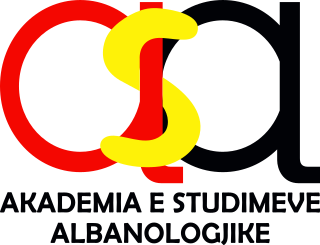
The Academy of Albanological Studies is the main institution of albanology in Albania.
Constantine of Berat, known among Albanians as Kostandin Jermonak Berati or shortly Kostë Berati, was an Albanian writer and translator of the 18th century.
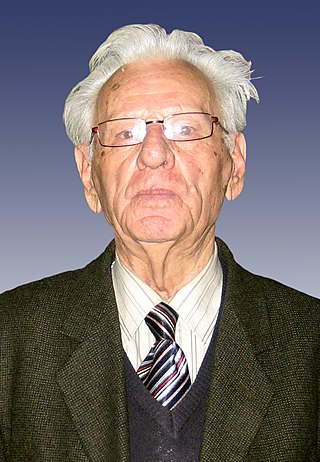
Idriz Ajeti was an Albanologist from Kosovo and one of the main researchers and authorities on the Albanian language studies of post World War II. He was involved for a long period in the academic life of the University of Pristina, and was a member of the Academy of Sciences and Arts of Kosovo, being its chairman for seven years.

Shaban Demiraj was an Albanian albanologist, linguist, professor at the University of Tirana from 1972–1990, and chairman of the Academy of Sciences of Albania during the period of 1993–1997.
Nikollë Gazulli was a parish priest and Albanologist lexicographer with an interest in ethnography. He wrote the first onomastic dictionary of Albanian and is known as the co-founder of lexicography in the language along with Pano Tase, though Gazulli would be the last cleric to publish in the field within Albania’s borders. Linguist Aleksandër Xhuvani called him the "Father of Albanian toponymy, while Father Zef Pllumi called him “the greatest expert the [Gregj Fishta] Franciscan Library ever had [on staff]." Despite his contributions, he was held in damnatio memoriae by the People's Socialist Republic of Albania and therefore never mentioned in Albanological discourse during its rule.

Said Najdeni, also known as Hoxha Voka, was an Albanian imam and activist in the Albanian National Awakening.
Pajazit Nushi was a university professor, psychologist and scientific and social-political worker from Gjakova, Kosova. Member of the Academy of Sciences and Arts of Kosovo.